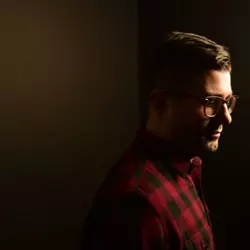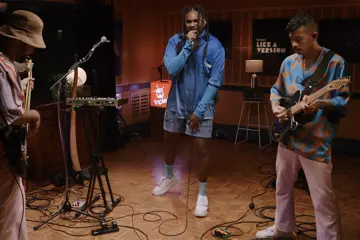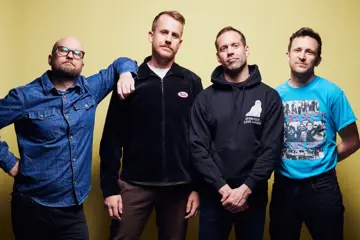 Into It. Over It.
Into It. Over It.New Jersey-born, Chicago-based musician Evan Weiss is audibly, deservedly, excited. Only a few weeks out from heading to Australia for his first-ever visit to the country, the brains behind beloved indie/emo outfit Into It. Over It. knows exactly what he wants to get out of his maiden sojourn.
Yes, he's looking forward to the shows, and, sure, he's put a lot of time and effort into pulling together a set list to please as many ears as possible — but, away from the stage, there's one thing sitting foremost in his mind about the trip.
"I absolutely have to do as much of the touristy things as possible," Weiss effuses over the phone from his home in Chicago. "I really, obviously, as an American, feel like I've gotta hold a koala, and I have to get a photo in front of the Opera House… I have to do these things that, you know, you guys probably think it's pretty hackneyed but, for me, it's exciting. I'm a huge fan of touristy experiences."
That's understandable, honestly; along with being the central figure of IIOI, Weiss has been a member of multiple bands over the past several years, including Pet Symmetry (with Erik Czaja of Dowsing and drummer Marcus Nuccio) and Their/They're/There (with Matthew Frank and Chicago indie legend Mike Kinsella), during which time the guitarist and singer has garnered the rare perspective of being something of a perennial tourist; of seeing things that weary peepers no longer value through fresh eyes.
Don't miss a beat with our FREE daily newsletter
Indeed, when on the road playing as Into It. Over It. (the band started, and occasionally remains, as a solo project, with drummer Josh Sparks being the closest thing Weiss has to another permanent member), he remains, even now, abuzz about the sights and sounds that he has no hope of experiencing from the window of his Illinois apartment, describing himself as "super-excited" about his impending Aussie jaunt.
As we discuss the nature of people taking remarkable sights for granted and the seeming universality of that affliction, Weiss recounts a tale from a recent trip to England being driven around by a local friend named Paul: "We were like, 'We really want to see Stonehenge! We want to see Stonehenge!' and Paul was like, 'Why would you want to see Stonehenge? It's just a pile of rocks,' and that blew our minds," he recalls.
"We were like, 'What do you mean "It's just a pile of rocks"?' You know, like, you grow up and you watch Spinal Tap and Stonehenge seems like the most mystical place in the world, and we told him that," he continues. "We were like, 'We're Americans, please take us to this thing,' and then we found out as we got there that he'd never been before. He was talking shit and he'd never gotten to see it, and then when we were there, we were walking around and he was like, 'Yeah, you're right, this is actually really cool,' and we were like, 'We told you, dude!'"
For a man who made his name helping to revive a genre that has been unfairly maligned for, oh, the majority of its life-span as being the stomping ground of unbearable sad sacks, Weiss is an unabashedly enthusiastic guy; some would even say unexpectedly so. In the final weeks of his 31st run around the sun, nearly 10 years on since his first show under the IIOI moniker, seven years since his ambitious 52 Weeks EP and five since debut LP Proper, Weiss remains boyishly charming, but is also exceedingly thoughtful, insightful and considerate.
To elaborate, it's clear, for example, when he sings in Open Casket — the opening track from acclaimed recent record Standards — of "uninspired" friends who "torched their 20s like it's kerosene", that it's not just a statement of sympathy so much as an assertion of defiance, that Weiss will not let himself fall into any traps of taking life, or its wonders, for granted. All of which possibly goes some way towards explaining how, at the outset of Standards' creation, Weiss and Sparks found themselves in an isolated cabin in Vermont, crafting an IIOI album in a way neither of them had ever approached one before: entirely on analog recording equipment. It was a trying process — they were miles away from the nearest... well, anything — but, ultimately, Weiss says, it left an indelible mark on the band's creative approach to their work, remaining a nostalgic and pleasant experience even more than a year on from having gone through it.
"You know, now, it's funny, I was at Josh's ... it was just his birthday … and we were having a party at his house," Weiss recounts. "He had a couple photos from the cabin — we had a friend, Emily, who came and visited during that and took some photos of the space, and he had them framed on his wall, and I was like, 'Aw, I want those!' and I texted Emily right away, like, 'Hey, can you send me those photos you took in the cabin? That's something I really want for my house'.
"I mean, it was romanticised while we were there, and I think it's become even more nostalgic and romanticised about a year later, just thinking back on it. That experience was such a positive one, and such a rare one — it's not a thing that a lot of people get to enjoy, is spending a month with their best friend making something somewhere remote and far off — and I think the whole point of making Standards the way we made it was just trying to enjoy ourselves the entire time. Josh had just come out of a band where, I think, making music was really painstaking for him, and I'd come out of making a couple Into It. Over It. records that were very hard and difficult, and kind of painstaking to make, and I think we'd kind of both forgotten what it was like to have a really good time making music.
"So that was the primary goal, was just to have fun, and just to write whatever; like, even if it wasn't going to make it onto the record, just to make something. And I think that's kind of become the mission statement for at least him and I since that process, and it's shaped the way the band has been approached for the last 12 to 24 months."
From the sounds of things, it's likely to shape the way the band will be approached for the remainder of its career, too, with Weiss admitting, "I don't know if I could make another Into It. Over It. record on a computer."
"We've kind of talked about it since then, and it's really just a process that we really enjoy, not only for the inner process, but also as players — it really helps you become a better player … You know, in Pet Symmetry ... we just made another record and we did it to computer, and I was having a really hard time trying to incorporate so much of how Standards was made with this Pet Symmetry record, kind of being like, 'I don't want to tweak anything, I don't want to edit anything; I want it to sound like a real record, and I want it to sound like it's us playing it,'" Weiss explains. "But then you get that moment where you get that take and it's a great take, and there's one tiny thing wrong with it, and you're like, 'Man, if I punch that one section, it'll be done,' so there's that internal struggle...
"It helps you rethink music, it helps you rethink what you're making, it helps you rethink how sound is made, and it makes you rethink your approach."
To the common, lazy ear, that sounds like way more effort than necessary to expend on something that few listeners will actually pick up — except that it is absolutely noticeable throughout the album. That dedication, that love, that underlying joy — all of it underpins every song on Standards' excellent track list; the notion that these are people who thoroughly believe in what they're doing, and the way they're doing it, utterly shines through in the energy captured on record.
"I'm glad that shows," Weiss smiles. "That was a thing we absolutely wanted to capture, and I think when we were writing the record, too, we were kind of looking at it with this 'can you top this?' attitude — like, 'Hey, how fast can you play this thing? How slow can you play this thing? How much can you fit into this bar? What could you take out that will make it a little more intentional?' and really having fun with placing our accents and placing our small details and really kinda getting our rocks off what we could do just to put a smile on each other's faces.
"It definitely shaped our relationship as friends a little more. You know, we'd gone into it already being close, but we left even closer, and we definitely were able to sort through all of our styles of communicating, whether that was through food or through music or through other things we had in common or didn't have in common — that back-to-basics style, which is something that I've always been maybe afraid of, I've definitely learnt to really appreciate. Like, you wouldn't believe how expensive it is to be alone. It costs a lot of money to be alone, and it's a quality that you don't realise how much you desire or miss until you have it, because it's really, really difficult to achieve, that kind of solitary confinement."
We're not talking about your run-of-the-mill, pissweak, "being home alone in a big ol' city" isolation, mind you — we're talking all-out, last-man-on-earth style nothingness in every direction.
"There were definitely a few instances where, because the cabin was running on generator power, if the generators would go out, there was nothing," Weiss tells, suddenly making the entire experience sound much less appealing. "There was no phone, there definitely wasn't any working electricity whatsoever, so I would be stranded until somebody would come to check on the house, you know, without the ability to get the generators working again. So some of those moments were actually kind of scary, like, 'Wow, if nobody ever came out here again or if I got snowed in … I could die!"
He laughs at the prospect, because that's what spending time alone in the wilderness does to a person, apparently. No, seriously — Sparks wasn't even there during Weiss' first few days at the cabin.
"There was a time — so the first, like, seven to eight days, I was there completely by myself. Josh joined me, like, a week into the process. The first week, I was writing things on my own so that when he showed up we had a lot to work on. And so there was a moment, like day four, where the power went out, and I was there completely by myself, and I, you know, strapped on my snow shoes … the snow was too bad to drive out, so I had to walk about three miles down the road just so I could get, like, a glimpse of cellphone service and be able to text the person, Pat, who was like the property manager, so he could come out and fix the generator. But I remember it being, like, a five-hour affair, having to trudge out in the snow, basically down a mountain, to connect with him and tell him, like, 'Hey, I'm powerless out here, please come and help me!'"
On the plus side, that powerlessness, lack of comfort and forced isolation, all woven together by Weiss and Sparks being in a situation they'd never before had to deal with, ended up yielding one of the strongest IIOI albums to date, if not categorically the strongest.
Now, Weiss is almost about to knock over another first in the form of his maiden Australian tour. The first show — at Wollongong's Rad Bar on Tuesday 27 September — is actually Weiss' birthday, so be sure to get out and help make it an extra-celebratory affair. For his part, he's been putting in the work for quite some time to make sure that his set list and performance is up to snuff when he touches down in a couple of weeks' time.
"I just did a short little acoustic run here with Jeremy Enigk from Sunny Day Real Estate — so we were together and I was really, you know, taking some time every single day to go through some of the Standards songs and figure out ways to perform them that felt like it was doing the song justice," Weiss says.
"A lot of the times, when I'm playing solo, I'm just playing the guitar part, playing the song basically the way I would with the band behind me, but just without the band behind me. But now that the solo show's become more infrequent, and it becomes more of a special occasion or something like this … I'm trying to make the solo show its own experience, separate from the band. And at this point I feel like I [could] perform pretty much the whole record. There's only a couple of songs that don't work; a couple of songs on Side B and one song on Side A… but if I can play nine songs off the new record, I feel like that's pretty good. That's a good representation."
Of course, it won't just be Standards getting the time of evening when Weiss hits local stages — fans of earlier works including Proper and 2013 sophomore Intersections (plus as-yet unmentioned 2011 EP Twelve Towns) will also be catered for, as Weiss wants to make sure — just in case this is the only time he gets to make it to Australia — that everyone walks away with the kind of deep, unmovable smile on their face that he and Sparks brought out in each other at that isolated cabin in Vermont.
"I definitely want to be as prepared as possible, because I've never been before and I want to make sure that people are coming, and if this may be the only time that I ever get to go down there, I want to play songs that people want to hear," Weiss says. "Frankly, I have no idea what to expect — I could show up and there'd be two people there, and I'd be, like, 'Cool, man! Two people in Australia like what I'm doing!'
"But yeah, at this point, solo, I probably know maybe between 40 and 60 songs, so not that I'm absolutely going to play all of them — I'd be playing for fuckin' hours — but I know a pretty good amount of stuff from all the different records, and I can hopefully pull out enough material to hopefully not let anybody down."
Into It. Over It. (Evan Weiss) tours Australia from Tuesday 27 September. See theGuide for more information.















